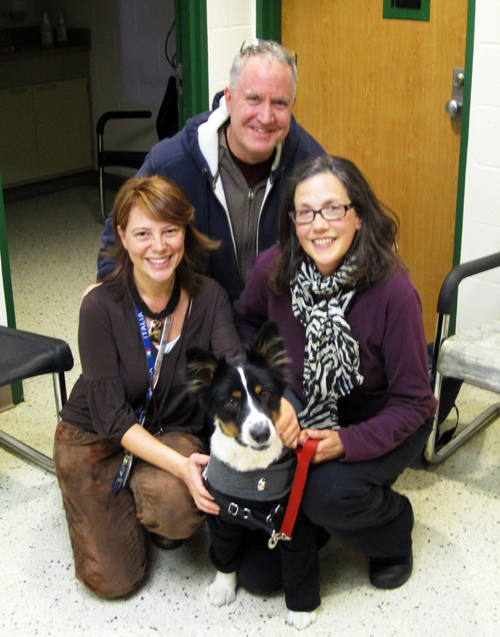EAST LANSING, Mich. — Plagued with a defective heart valve that caused fluid accumulation in his lungs, Leo was in need of serious medical help.
His loved ones opted for open-heart surgery. And after a successful operation, Leo is recovering nicely and leading a full life: Chasing balls, chewing toys and barking at friends.
Leo, a nearly 2-year-old Australian Shepherd from Ann Arbor, was the first dog to undergo open-heart surgery last fall at Michigan State University’s Veterinary Teaching Hospital. Since then, Augusta Pelosi, a cardiac surgeon with the College of Veterinary Medicine, has led a team of more than 20 veterinary and human health experts in performing two more successful open-heart canine surgeries.
She is one of the few veterinary cardiac surgeons in the world who performs the rare surgery on companion animals.
“Our service provides an alternative that can save lives,” said Pelosi, who joined the college’s Department of Small Animal Clinical Sciences in 2008 after previously completing residencies in surgery and cardiology at MSU with pioneer veterinary surgeon George Eyster. “Medications can be used to treat a variety of cardiac conditions, but sometimes they can only do so much and come with side effects.

Leo, the first dog to undergo open-heart surgery at MSU, is seen with veterinarian Augusta Pelosi (left) and his owners. Courtesy photo/ Michigan State University
“The only way to fully correct many cardiac defects is to target the problem itself with open-heart surgery.”
After several years of training and research, Pelosi now leads about 20 veterinary professionals – specializing in critical care to cardiology to anesthesia – as part of the Veterinary Teaching Hospital’s open-heart team. Pelosi also partners with human health professionals from the University of Michigan’s cardiac surgery team.
The result: A world-class team of experts performing surgeries for dogs to correct congenital and acquired diseases ranging from deformed valves in the heart to the abnormal narrowing of vessels.
In Leo’s case, he came to MSU for correction of a dysplastic mitral valve, a condition where a valve in his heart did not form properly during development and resulted in improper closure and fluid congestion of the lungs.
Despite good response to medication, Leo’s condition progressed and would have shortened his life expectancy. Bari Olivier, an MSU cardiology section chief, recommended surgery to correct Leo’s condition.
During surgery, a mitral valve ring was placed and secured in Leo’s heart to provide support to the valve, thus eliminating blood from flowing back into the atrium. After surgery, Leo was assigned to the critical care group of the open heart team led by Amy Koenigshof.
Leo was assisted by a mechanical ventilator for a night; one week later he returned home and continues to do well. His owners report he is now eating normally and taking short walks outside.
While the surgeries are of course risky, many owners are willing to provide the best services available for their pets. After surgery, dogs with cardiac defects often fully recover and go on to enjoy a normal life, Pelosi said.
“There is a perception that heart surgery does not work for animals,” she said. “In human cardiac surgeries, this perception also existed many years ago. We have the need, we have the skills and we have the ability to do it successfully.
“While surgery is not an alternative to medical treatment or interventional procedures, it is an option that should be offered to our patients when it is the superior treatment option or other options have failed.”
For more information on the MSU College of Veterinary Medicine and the services offered at the Veterinary Teaching Hospital, go to https://cvm.msu.edu/.
*Source: Michigan State University
